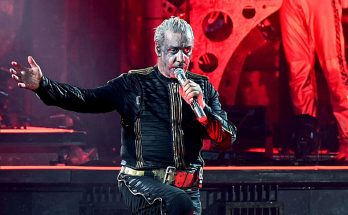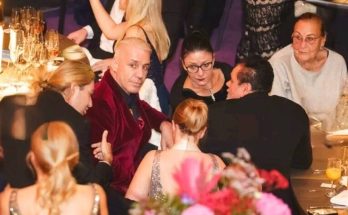Last night at Cain’s Ballroom in Tulsa, an atmosphere of reverence and celebration filled the historic venue as Bono and The Edge stepped onto the stage to accept the 2025 Woody Guthrie Prize on behalf of U2. The night was more than just an awards ceremony—it was a convergence of ideals, music, and activism, echoing the spirit of the legendary folk troubadour whose name graced the honor. Woody Guthrie, known for his fierce advocacy for social justice and his timeless songs about the human condition, has inspired generations of musicians to see their art not merely as entertainment, but as a tool for change. It was this same belief that resonated throughout the evening as U2 was recognized for their decades-long commitment to music with meaning and their unwavering voice for compassion and justice in a fractured world.
Bono, dressed in his usual understated black with his signature sunglasses reflecting the soft amber glow of the stage lights, took the microphone to a thunderous ovation. His voice, a blend of humility and conviction, filled the ballroom as he began by thanking the Woody Guthrie Center for what he called “a recognition of purpose rather than fame.” He spoke about how Guthrie’s words—particularly the simple but defiant phrase “This machine kills fascists,” which adorned Guthrie’s guitar—had shaped U2’s understanding of what music could and should do. Bono described Guthrie not just as a songwriter, but as a conscience for America, a poet who sang for the voiceless and challenged the comfortable to care.
Beside him, The Edge stood quietly, his eyes scanning the audience filled with fellow musicians, historians, and lifelong U2 fans who had gathered to witness the historic moment. When it was his turn to speak, he reflected on how Guthrie’s songs were foundational to modern protest music and how his influence reached across oceans and generations. “We grew up in Dublin,” The Edge said, “but Woody Guthrie’s America was never far from us. It was an idea as much as a place—the idea that songs can be weapons of truth.” His words hung in the air, drawing applause and nods of agreement from the crowd.
The ceremony was intimate yet powerful. A sense of shared purpose rippled through the audience as clips of Guthrie’s original recordings played between speeches. His grainy voice from the 1940s, still charged with urgency, felt eerily present. When Bono and The Edge accepted the award, they were handed not just a trophy, but a symbolic link in the chain of artists who carry Guthrie’s torch—musicians who understand that melody and message are inseparable when it comes to shaping the world’s moral imagination.
The honor of the Woody Guthrie Prize is bestowed annually on artists who embody the late musician’s commitment to speaking truth to power and giving voice to the marginalized. Past recipients include the likes of Pete Seeger, Joan Baez, and Bruce Springsteen—artists who, like Guthrie, have used their platforms to confront social issues and advocate for a more just and compassionate world. For U2, whose body of work is steeped in activism, from their support for Amnesty International to their fight against global poverty and AIDS through the ONE Campaign and (RED), the award felt like a natural continuation of a lifelong mission.
During their acceptance, Bono spoke about the intersection of art and activism. “Woody understood something that every songwriter should,” he said, his voice low but charged. “He knew that you don’t write songs to sound good—you write them to mean something. Music that doesn’t shake the world awake isn’t worth making.” He paused, then added with a wry smile, “At least that’s what we tell ourselves when we’re trying to get another song past The Edge.” The audience laughed warmly, a moment of levity in an otherwise reflective evening.
Later, The Edge picked up his acoustic guitar and strummed the opening chords to “I Still Haven’t Found What I’m Looking For,” transforming the ballroom into a place of communal spirit. Bono’s voice, rich with emotion, filled the room as he delivered the lyrics with the quiet reverence of a prayer. The song, though decades old, felt newly charged with meaning in the context of the evening. It was as if the spiritual yearning embedded in the song found kinship with Guthrie’s restless idealism. Midway through the performance, Bono seamlessly transitioned into a few lines from Guthrie’s “This Land Is Your Land,” inviting the crowd to sing along. The combination of both songs—a hymn of longing and an anthem of belonging—created a transcendent moment that bridged eras and ideals.
Throughout the night, Bono reflected on the parallels between Guthrie’s America and the world today. “Woody sang about a country divided by class, by race, by fear,” he said. “And here we are, nearly a century later, still fighting many of the same battles. But maybe that’s what art is for—to remind us that the story isn’t over yet.” His words struck a chord with those in attendance, particularly younger artists in the crowd who see U2 as proof that you can remain relevant while staying rooted in principles. “Hope,” Bono added, “is not naïve—it’s the most rebellious thing you can hold onto.”
The ceremony also included a short video montage of U2’s humanitarian work and their moments of musical activism, from their 1985 Live Aid performance to their advocacy for debt relief in developing nations. The clips underscored how seamlessly the band has woven politics, faith, and empathy into their art. For Bono and The Edge, receiving the Woody Guthrie Prize wasn’t a career milestone—it was an affirmation of why they started making music in the first place. “We were just four kids in Dublin trying to make a noise,” The Edge said. “We didn’t know it would turn into a lifetime of trying to make a difference.”
After the ceremony, the two musicians sat for a brief Q&A moderated by the Woody Guthrie Center’s director. They spoke candidly about their influences, the state of modern music, and the need for artists to stay engaged in the world’s struggles. Bono mentioned that Guthrie’s spirit could be felt in the protest songs of Bob Dylan, in the defiant poetry of Patti Smith, and even in the new generation of socially conscious artists emerging today. “Every time a young musician picks up a guitar and tells the truth,” he said, “Woody’s still alive.”
The Edge shared his own reflections on how music has always been a unifying force. “When we tour, we see people from every background singing the same words,” he said. “For a few hours, the divisions disappear. That’s what Woody wanted—to remind people that they belong to each other.” His observation resonated deeply, especially given the ongoing global tensions that mirror the kind of societal unrest Guthrie once sang about.
As the night wound down, Bono offered one final thought before leaving the stage. “The truth is,” he said, “we’re just custodians of something bigger than ourselves. The songs, the causes, the courage—they belong to everyone. Woody understood that music doesn’t belong in museums; it belongs in the streets, in the hearts of people who still believe that love and justice can coexist.” The room erupted in applause, a standing ovation that lasted long after he finished speaking.



